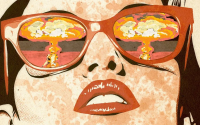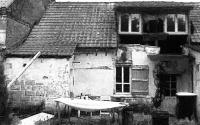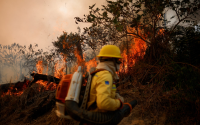27 April 2006Znet
Where will the next blow land? That is the question. Not if it will come, but rather when, and on whom will it land, and what kind will it be?
Five-year-old L. believes the solution is to sleep every night in his parents' bed, and in that way to be protected from the shelling. But even there he is not able to fall asleep because he is so worried and afraid. In the kindergarten in the yard outside the house, the children speak all the time about the "booms" that fill their day. Booms from the sea and booms from the land. Day and night. Sometimes three per minute, sometimes three per hour. Sometimes simultaneously from the land and from the sea. The air quivers, a flock of birds takes off in fear, and for a minute the silence of terror reigns. Are there casualties? Who, where, how many? If the parents succeed in hiding from their children pictures of the other children who have been killed or wounded by the shells, the older children fill in the gory details from what they saw on TV or read in the papers. They strengthen each other's fears.
In an agricultural neighborhood near the border in the northern Gaza Strip, north of Beit Lahiyeh, the fears are made concrete by the shrapnel that has fallen countless times on the asbestos roofs. The parents have sent the children to relatives in Gaza city, so they may go to school far away from the shells. "In our neighborhood, people have not yet been killed," Z. says cynically. But the shells have taken their toll: two donkeys, a few sheep and a handful of chickens.
In the northern Gaza Strip, thousands of farming families are due to return to work their lands which were destroyed by Israeli army bulldozers over the past five years. Immediately after the Israeli army pulled out of the Gaza Strip, government and non-government bodies joined forces to rehabilitate the scorched earth. They howed and they plowed and they distributed seeds and saplings. But the farmers are afraid to go out to their lands.
Z. spent many years in jail, as did his brother. Another brother was a wanted man until he was killed in an assassination. Z. says he has several times prevented armed groups from firing rockets from their area. Because of his family history, he was able to stand in front of them and say that they have "had enough of destruction and bloodshed, we are not afraid of you. No benefit comes from fighting the occupation with the homemade rockets you are firing."
In places where large and strong families live, such as Beit Hanoun, they have succeeded several times in chasing away those who fire the rockets.They move to more open spaces or to areas where the families are less strong, such as Beit Lahiyeh.
During a meeting of pupils, angry voices were heard saying, two weeks ago:"Let them fire the rockets from where they are, in [the refugee neighborhood of] Sheikh Radwan." But people do not vent their anger in public against those who fire the rockets. "Anyway, whether there are rockets or not, the Israelis fire shells," is the unequivocal conclusion in Gaza. Z. says:"There are no rockets in our area now, only Israeli shellings. I act as a guard protecting the Israelis, preventing rockets from being fired here by armed groups, but nevertheless the shells fall in our area."
"There is a law in Israel that every soldier must fire a shell every hour,"says B. He lives in a new housing development in the northern Gaza Strip, in which mainly Palestinian policemen who returned home from abroad reside.Three shells have already fallen on this development but by some miracle no one has been killed. One time, a shell fell on an iron banister, another time in the yard, and another time it did not explode. They are so close to the Erez checkpoint, to the border, that they can hear when the shells are fired; they hear them whistling above and landing and exploding. This Wednesday morning was strange, he said. By nine o'clock there had been no shells.
B.'s wife gave birth two weeks ago and is staying with her parents in Gaza city. But she is due to return home today (Friday). "Where will we go? We are like all those who live in Gaza. If there is no shell from the sea or land, we will be hit by a missile from a plane or drone. In the beginning, the children who fired the rockets from among us would move around next to us. As a policeman, I have instructions to prevent firing. We chased them away several times. But I too, as a policeman, have become a target for the shelling. With or without rockets, you shell us. Everyone here is walking around dazed, without sleep, because of fear of the booming noises. We sit in our homes, waiting to see who will die first."
The disaster of the shelling near his home has made the disaster of the economic situation seem easier for B. As a policeman, he has not received a salary, like the other workers in the public and security sectors of the Palestinian Administration. Israel does not transfer to the Palestinian Authority the money which comes from collecting taxes on goods imported via its ports. The United States and Europe have cancelled their assistance to the PA. The salaries of 140,000 families in the West Bank and Gaza, amounting to some NIS 1,000 - NIS 2,000 per month per family, are already three weeks overdue.
"My situation is good. My wages did not get to the bank but I can buy from the shop on credit," says B. "What can the unemployed do? No one sells them anything, even on credit."
L's father is currently unemployed. He is an engineer and was promised a new job in one of the infrastructure projects being supported by DIASU, an American aid fund. But now the fund has cancelled its donations to the projects that were due to be carried out through the PA and its government offices. The contractors he knows do not even answer the tenders that are published in the newspapers. What is the point, one of them says, we can't take on any commitments - we don't know when the raw materials will arrive, when Israel will open and close the checkpoints. We have no estimate when the work will be finished because this depends on the raw materials. I can't make an obligation to pay the workers because I don't know when those ordering the work will be able to pay me. Even the shopkeepers areunemployed: There are no buyers, no goods, there is no point in keeping them or in paying for them from an income that does not exist.
The supermarket in the teachers' neighborhood in Tel el-Hawa in Gaza was closed for two days and its workers sent home on forced leave. There were no shoppers in the el-Kishawi supermarket in the Rimal quarter on Wednesday afternoon and its shelves were half empty. Worried parents said: We won't be able to pay registration for the universities next month.
The roads are also empty: The center of Gaza city is no longer blocked with traffic as it used to be. The emptiness is particularly felt after 2.30 in the afternoon when the school children and clerks go home. The roads are empty because people are saving: They do not shop, they do not want to pay for transportation, they do not want to pay for gas. Although vegetables are very cheap, even the markets are empty. The vegetables cannot be marketed in the West Bank and they have flooded Gaza and Rafah. A suggestion was even made that they be distributed free, through some non-governmental agencies.The roads are empty, also, from fear - fear that a shell or missile could explode at any moment.
"I am not surprised that Israel is shelling us like that," says H., a Hamas activist. "That is its nature; that is what it has always done. I am surprised at those of us who are doing everything to trip up the government." In the streets, people do not point an accusatory finger at the Palestinian rocket launchers "because everyone is busy with the missing salaries, with trying to save money, with being afraid of the shells Israel is firing, and with anxiety about the future," says M. who is opposed to firing the rockets. S. who is also opposed, complains that people are stuck in a mentality of "reaction and revenge" and therefore they approve of the firing.
But accusatory voices have been raised in Hamas; they say that senior Fatah officers are behind those who are firing the rockets, that they send them out to fire the rockets so that there will be greater political and security chaos and more pressure on the new government to resign. One side makes accusations and the other rebuffs them.
A field worker for an NGO who does not have ties with either side, says this appears to be a baseless allegation. "Official Fatah opposes firing rockets.The groups that are continuing to fire the rockets are those who are close to Islamic armed groups," he says, quoting informed sources of his own.
But, he confirms, senior Fatah officers are behind the verbal incitement campaign being waged against the new government: They are behind the complaints that the government does not pay salaries and therefore is not fulfilling its duties - as if this is the first time that a Palestinian government is late with salaries, as if it alone is responsible. They are also behind complaints that its ministers are funding advisers and senior officials known for their support of Hamas, while most of the public sector in the past consisted of people known for their support of Fatah, as well as complaints that the Hamas ministers are not as competent and talented as expected.
There are two opposing points of view among the population. There are those who complain that the Hamas movement should have taken the Israeli and international response into account when it ran in elections for a parliament with limited authority and when it agreed to set up a government that was limited in advance. In other words, it should have taken different decisions in accordance with its political ability - not to form a government, or to agree to Abu Mazen's terms and to have a platform that would not make it possible for the entire world to boycott the Palestinian people and impose another economic and political sanction. Every day another country announces that it is canceling the economic aid that over the past five years has become the Palestinian nation's oxygen. The latest one, for the time being, was Japan. Israeli banks do not transfer money to Palestinian banks. The Arab Bank is not prepared to give the government loans. Even if Iran and Qatar send money to the PA, how will it reach them?It has to go through Israel's central bank which, of course, will refuse.
The other school of thought represents people like Z., who does not support Hamas. He is convinced that the pressure will have the opposite effect: It will merely serve to strengthen the public's support for the government.
But everyone is afraid that, in addition to the security blow - in the form of shells - and in addition to the economic blow, there will be yet another blow, and it will be felt as an explosion when the tensions between Hamas and Fatah become even greater. About ten days ago, Fatah supporters blocked the way of Prime Minister Ismail Haniyeh. He did not make a fuss about it.Last Tuesday, people in Gaza said, members of Izzadin el-Kassam opened fire at the person they consider responsible for blocking "their" prime minister's way - the preventive security officer in Jabaliyeh. The more the Fatah people and their armed supporters complain and demonstrate about the failure of the new government, the more the armed Hamas members feel obliged to defend its honor.
There are mixed and confusing messages. Official Fatah is opposed to military escalation and Abu Mazen condemned the terror attack in Tel Aviv in no uncertain terms. But for their part, the Al-Aksa Martyrs' Bigade, which Abu Mazen and the security forces are not able to rein in, condemned his condemnation. Hamas still officially holds on to the theory that the Palestinian nation has the right "to defend itself." In a video conference with Palestinian foreign ministry officials, the foreign minister, Mahmoud a-Zahar, said that the platform of the new government remains loyal to the right of armed resistance. One of the officials in Ramallah asked him whether this meant he should go and blow himself up with an explosives belt.This was the opening shot in the tense relations.
On the other hand, Interior Minister Said Seyam held a secret meeting with the mukhtars of the large and important families in Gaza. Sources in Fatah and Hamas say that he proposed they sign a petition calling for an end to the rocket firing from Gaza to Israel. "Sign it yourself," the mukhtars replied, "You are the minister." But the Hamas is afraid to make public any position that can be seen as retreating from an armed struggle for fear that the Fatah will use it in propaganda against it.
Hamas is busy trying to quell false rumors that abound in the streets. One such rumor is that salaries were paid but only to those who support Hamas.Another is that Haniyeh participated in a heavy meal immediately after delivering his "hyssop and oil" speech a week ago in which he stated that the Palestinian people could exist on those two items rather than surrendering. Hamas is also accused of behaving in ways typical of Fatah during its rule.
Z. agrees with Haniyeh and educates his children in this way: "I was born in a refugee tent, I studied with the light of a candle, we ate hyssop and oil and we received clothes from UNRWA. My children can also live like that." S.laughs bitterly: "Which oil? And which hyssop? People have found out how expensive they are. You pay 20 shekels for a liter of oil and seven shekels for half a kilo of hyssop. People no longer speak about oil and hyssop. They eat a cheaper substitute, 'duka,' derived from the sumac spice.'






